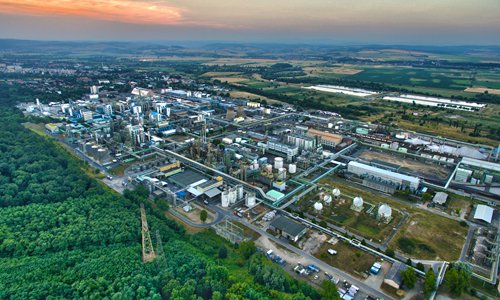
Overview of the China-Hungary BorsodChem Economic and Trade Cooperation Zone in Kazincbarcika, Hungary Photo: Courtesy of BorsodChem Zrt
The economic cooperation and bilateral trade between China and Hungary have been boosted over recent years and new opportunities will emerge under the China proposed Belt and Road (B&R) initiative and the Hungarian "opening to the East" policy, officials and executives have said.
China has become the largest trading partner for Hungary outside Europe. Against the background of sluggish global trade, the bilateral trade volume between the two countries reached $7.42 billion during the first nine months of this year, up 14.3 percent year-on-year, according to a document the Association of China Enterprises in Hungary (ACEH) sent to the Global Times on Monday.
China has become the biggest investor in the Central and Eastern European Countries (CEECs) and its total investment in Hungary has reached $4.1 billion so far, said the document.
Ding Jiansheng, president of the ACEH, told the Global Times that currently there are hundreds of Chinese firms developing in Hungary, mainly in sectors such as chemical engineering, telecommunications, finance, new energy and e-commerce.
"More Chinese enterprises have shown an interest in investing in Hungary over the last few years, but most of them are still in the early stages," Ding said.
Ding noted that firms have been encouraged by the investment in Hungary by leading Chinese enterprises.
State-owned Wanhua Industrial Group, a high-tech enterprise focusing on innovation in chemical materials, is the largest Chinese company to date to have invested in Hungary.
Headquartered in East China's Shandong Province, Wanhua acquired BorsodChem, the largest chemical company in Hungary, in 2011 in a deal worth 1.26 billion euros ($1.5 billion).
The company also signed a framework agreement on BorsodChem's future financing with China Development Bank and the Hungarian Development Bank on Tuesday, which was witnessed by Chinese Premier
Li Keqiang and Hungarian Prime Minister Viktor Orban during Li's participation in the sixth meeting of heads of government of China and the 16 CEECs, according to a press release the company sent to the Global Times on Tuesday.
"The Hungarian government has attached much importance to the political and economic relations with China," Liao Zengtai, chairman of Wanhua, told the Global Times on Monday, adding that the China-Hungary BorsodChem Economic and Trade Cooperation Zone serves as a vehicle to attract overseas investment.
The cooperation zone project also plays a significant role in implementing the B&R initiative and Hungary's national policy of "opening to the east," through giving full play to the development opportunities along the Silk Road Economic Belt as well as the good investment environment in Hungary, Liao noted.
Chinese auto manufacturer BYD Co opened its first solely owned bus plant in Europe in the northern Hungarian town of Komarom in April, the first of its kind set up by a Chinese new-energy car brand in Europe. The first vehicle rolled off the factory assembly line in September this year.
More potential ahead
Like other Chinese firms that encounter difficulties in the early stages of going global, BYD has also had some issues due to a lack of experience in sales, product development and aftersales in the European market, He Yipeng, the representative of BYD in Europe, told the Global Times Monday.
"For many people, the electric vehicle is a new and future-oriented industry where BYD is a leading player, and it will take some time for the market to accept it," He said.
In order to improve the situation, BYD has conducted further localization of human resources as well as research and development since it settled in Hungary.
"The Hungarian labor force is both highly qualified and cost effective. In particular, it has a long history in bus manufacturing with advanced technologies," He remarked.
"Compared with the developed European countries, Hungary lags behind in infrastructure, which means it has more potential," He said.
"With the recovery of Europe's economy and the deepening of bilateral economic ties through the B&R initiative and the CEEC-China '16+1' cooperation mechanism, there will be more development opportunities in the future," said Ding of the ACEH.


